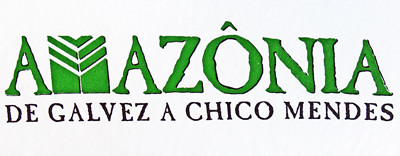
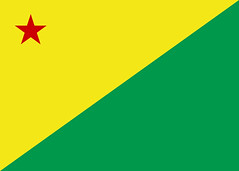

Once the Brazilian state of Acre seemed to be the center of the universe. At the dawn of the Twentieth Century and the second industrial revolution it was the only place in the world that was producing latex. But the fabulous rubber wealth (white gold) came to an end, first with the establishment of highly efficient rubber plantations in southeast Asia which soon flooded lower-priced latex into the global market and finally when World War II brought about a massive shift to synthetic rubber.
The boom was over, leaving in its wake an abandoned, impoverished population of workers who had no means or hope of ever returning to their region of birth. A small rubber trade was maintained as the stranded rubber-tappers eked out some income from the much less valuable latex, working under the harshest conditions and often at the mercy of the the patrões (bosses) who kept them in a condition of permanent indentured servitude (the post-abolition form of slavery). From the view of the centers of commerce and population in the South of Brazil, Acre had become the end of the world.
Then came yet another blow. In the post WWII period the Amazon forest began to be cut mercilessly to sell the valuable hardwoods and make way for cattle ranching. Indeed, by the late 60's there was something of a bonanza based primarily on the availability of recently deforested land that was dirt cheap (often free) and the global demand for beef. Deforestation and ranching were linked as Brazil became the world's biggest producer of beef. Now the seringueiros (rubber tappers) would have nothing. As the forest fell they were losing even the opportunity for indentured servitude.
Starting at the beginning of the year, Brazil's major TV network, O Globo, ran a nightly soap opera about Acre called, "Amazônia: From Galvez to Chico Mendes", or from the struggle for independence to the struggle for the forest. (Yes, in Brazil they actually have soap operas built and produced around serious topics.)
I had the unique experience of watching the inaugural sessions in the home of Seu Luiz Mendes and his wife Dona Rizelda in the rural Acre district of Caipixaba which borders on Xapurí where Chico Mendes launched his peoples-of-the-forest movement. And on the property there was an old-style seringueiro house appropriately adorned with a Chico Mendes poster.
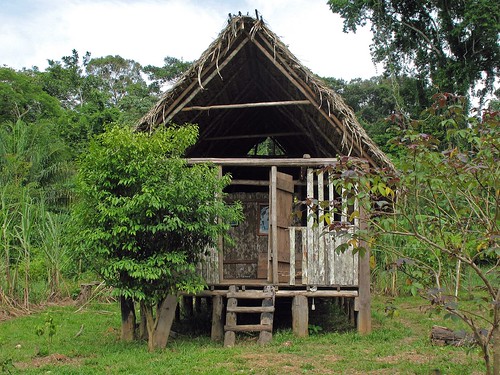
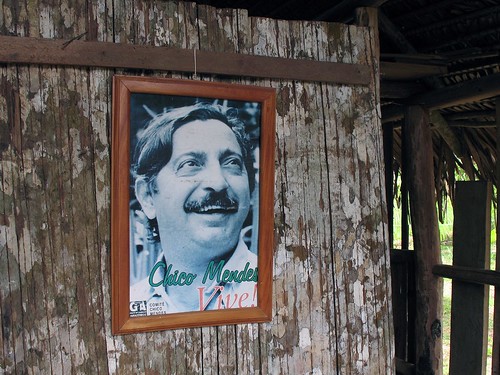
The Amazônia mini-series began with the early days of the rubber boom and the fight for the liberation of Acre, which though formally belonging to Bolivia was inhabited mostly by Brazilians. The first part centers mostly around Dom Galvez, who had been a diplomat in Argentina until he got caught in a messy affair and left to a seek fame and fortune in Amazônia. When he arrived in Acre in 1899 he soon proclaimed its liberation from Bolivia. A war was fought, a deal was cut, and Acre became a territory of Brazil.
When we were in Rio Branco last January, we visited the historical Palácio do Govenor do Acre
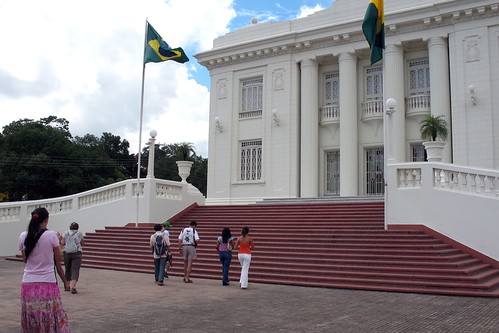
where we saw the huge painting in the central atrium that celebrates those early times.
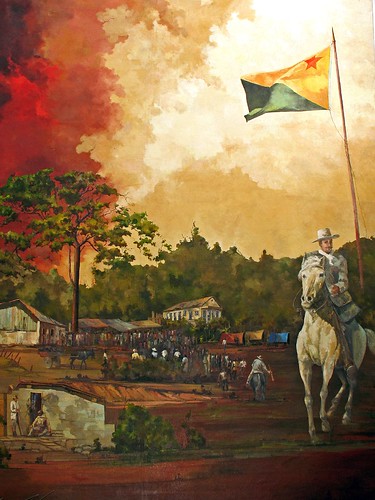
After the war is won the story shifts to the struggles of the Acreano settlers and the emergence of the movement led by Chico Mendes. One of the subplots along the way is to tell the story of another man who arrived in the area to try to better his economic condition, one from the state of Maranhão by the name of Raimundo Irineu Serra -- the founder of the Santo Daime. Across four episodes, the story of Daime moves from the early days with Mestre Irineu to more modern times when the character who becomes the right-hand man to Chico Mendes attends a Daime ritual. The scene was filmed in the present-day Church of Mestre Irineu, presided over by his real life widow Madrinha Perigrena.
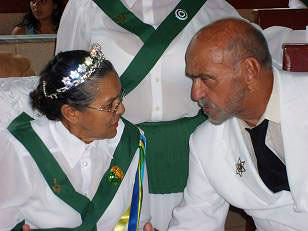
(photo from the blog of the Amazônia author)
He has a miração (a vision) in which his life and the history of Acre is played back and the scene ends as a Daime leader (played by Antõnio Alves of Alto Santo) delivers a powerful speech:
"It's been many years that we've been working and struggling over the face of the earth, because we have a mission to fulfill, and we are part of a people who brings a message to humanity. The message tells about the possibility of living in the forest, in peace and abundance, healthy and happy, without destroying nature. Working along with nature, not destroying it, and sharing with justice and generosity the fruit of our work. There were many who already came, who worked and struggled and lived, and also died for this message, for this mission."
Amazônia Santo Daime Story (in Portuguese - 19 minutes)
Today, the twin traditions of Irineu Serra and Chico Mendes are enshrined in Rio Branco. Chico Mendes, who is remembered worldwide, has his statue placed in the central downtown square and the main thorough-faire of the city is named after him.

And the bus line leading to the Alto Santo District on the edge of Rio Branco carries the name of Mestre Irineu, as does the zone of environmental protection and the road.
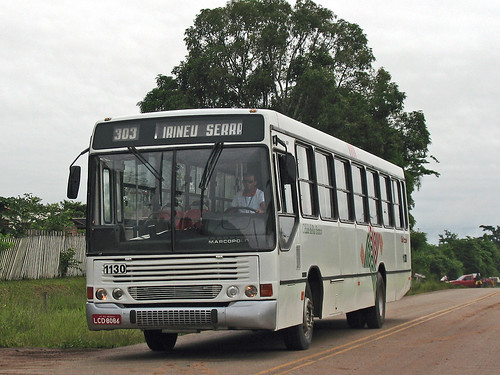
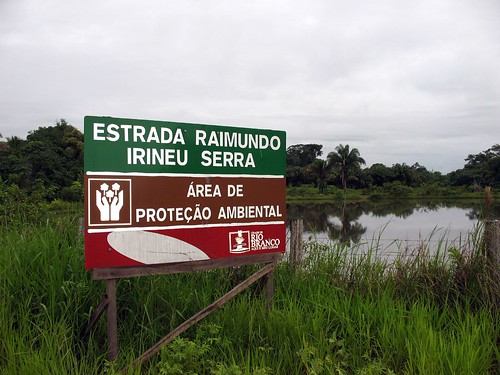
The Amazônia mini-series stretched across 55 episodes, continuing long after I returned to Brasilia. As the story unfolds it moves into the final years of the life of Chico Mendes. He struggles on relentlessly and with great courage as comrades are harassed and killed. His leadership comes to be recognized far from Acre and the Brazilian Federal Government begins to respond by taking some of the land out of the hands of the ranchers and placing it into protected reserves. Understanding the threat that he has become, he gives a speech in Rio de Janeiro predicting that he will be murdered. He returns to Acre despite the warnings and premonitions, saying:
"I do not want flowers in my burial, because I know that they are to be pulled out of the forest! I only want that my murder serves to end the impunity of the killers in Acre who, under the protection of the police force of 75, have already killed 50 people like me, seringueiro leaders, pledged to defending the Amazonian Forest and making of it an example that it is possible to progress without destroying. I go to Xapuri to the meeting with death."
And that is what happened on 22 December 1988, soon after he arrived home to be reunited with his family. In a very moving final scene, as his comrades carry his coffin through the country-side, the people recite the prayer of the rubber-tapper which is a version of the familiar "Our Father" or Lord's Prayer:
Rubber tree who art in the jungle
Multiplied be your days
Let your milk come to us
To be made into our rubber
As well in the press as in the crate
For the support of our families
Today and for all the days
Forgive us our ingratitude
Our anger as we confront
The evil things of the boss
Help us to free ourselves
From the spikes of the shark
Amen
As the final credits to this last episode of Amazônia roll across the screen, a very beautiful song is sung. Its lyrics say:
And this sun that shines so bright
Over the forests I come with love
Filling the chests of each Acreano
With nobility, constancy and value
Invincible and giants at wars
Let's imitate the unmatchable example
Of the great river that struggles with earth
Wins and enters the sea (still) fighting
I was a star of our flag
Amazônia Final Segment (in Portuguese - 9 minutes)
The lone star flag still flies over Acre. Many people, both political and spiritual, are drawn to its vision and wear its star. But its struggles have not ended. Oil and gas prospecting are being seriously proposed for Acre. And widespread planting of sugar cane for ethanol has already arrived. As the cane is planted on previous pasture land, the ranchers will have to search for new land that most likely will be acquired through logging and clearing. These are enormous pressures on the remaining forest and we could soon see a new round of massive deforestation.
Acre is no longer the end of the world. Indeed, as the great issues of climate change and profits and poverty dominate the global arena, Acre has moved back into the center stage. What happens in Acre may well be the model for the rest of the world. Development will occur, but for whom? The Acreano vision is one of people and nature living in harmony for the benefit of each other and the world. But facing the power of the large land owners and of the multi-national corporations of energy and agribusiness will not be easy. The global voice of the forest must be strengthened.
Some of the actors who played roles in Amazônia (the soap opera) saw the incredible destruction that has already occurred and set out to do something about it. They launched a petition to end the deforestation of Amazônia (the forest) and a web site to gather signatures. Its called Amazon Forever.
Today, on this Earth Day of 2007, you might consider going to the website to sign the on-line petition or, if the server is too busy, you can provide your information by email. Please check it out.





